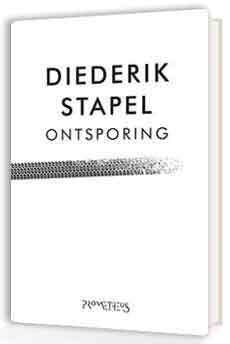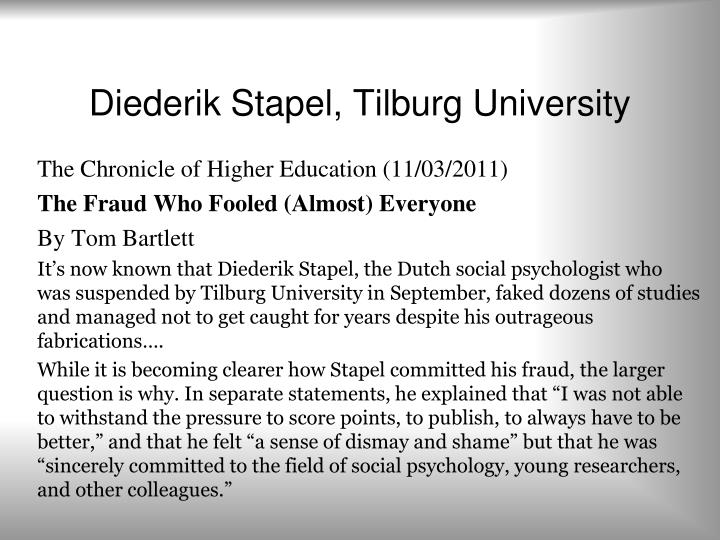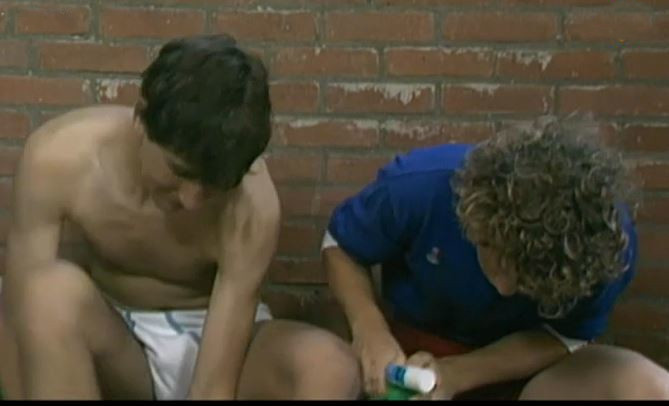 Diederik Stapel fabricated data for over 50 peer-reviewed articles, many of which were published in leading journals, including Science. He has now published Ontsporing (Derailed), a 315-page autobiography that provides a fascinating tale of the events leading up to and following the discovery of his large-scale academic fraud. [1]
Diederik Stapel fabricated data for over 50 peer-reviewed articles, many of which were published in leading journals, including Science. He has now published Ontsporing (Derailed), a 315-page autobiography that provides a fascinating tale of the events leading up to and following the discovery of his large-scale academic fraud. [1]
The book’s opening chapter depicts a sweating, indicted Stapel driving through The Netherlands, retracing the locations in which his fraudulent studies were presumably carried out, anxiously trying to straighten out his story and evade the inevitable. The scene is gripping. In the pages to follow, Stapel gives a first-person account of one of the biggest fraud cases in scientific history. If only for that reason, the book is priceless and revealing.
Although the details of how Stapel was caught have been widely publicized, Ontsporing provides the first glimpses of how, why, and where Stapel began. It details the first small steps that led to Stapel’s deception and highlights the fine line between research fact and fraud:
I was alone in my fancy office at University of Groningen.… I opened the file that contained research data I had entered and changed an unexpected 2 into a 4.… I looked at the door. It was closed.… I looked at the matrix with data and clicked my mouse to execute the relevant statistical analyses. When I saw the new results, the world had returned to being logical. (p. 145)
Stapel minutely describes how these small steps led to the habit of changing data and, later, to the fabrication of complete data sets. In Ontsporing Stapel explains the etiology of his fraud by likening it to addiction, although he admits that it is probably a combination of different factors, including: “The need to score, ambition, laziness, nihilism, want of power, status anxiety, desire for solutions, unity, pressure to publish, arrogance, emotional detachment, loneliness, disappointment, ADD, addiction to answers” (p. 226). He also describes various unsuccessful attempts at quitting his “drug.”
Given that Stapel’s deception went undetected for many years, one may expect a cunning scheme of data-fabrication. However, the book reveals that Stapel’s trickery was remarkably unsophisticated, even clumsy:
I preferred to do it at home, late in the evening, when everyone was asleep. I made myself some tea, put my computer on the table, took my notes from my bag, and used my fountain pen to write down a neat list of research projects and effects I had to produce.… Subsequently I began to enter my own data, row for row, column for column…3, 4, 6, 7, 8, 4, 5, 3, 5, 6, 7, 8, 5, 4, 3, 3, 2. When I was finished, I would do the first analyses. Often, these would not immediately produce the right results. Back to the matrix and alter data. 4, 6, 7, 5, 4, 7, 8, 2, 4, 4, 6, 5, 6, 7, 8, 5, 4. Just as long until all analyses worked out as planned. (p. 167)
To any crime there is not just means and motive, but also opportunity. In Stapel’s words, his fraud arose as a “toxic interaction of person and environment.” In his characterization of the latter — the academic environment of social psychology — Stapel insists on the almost complete absence of scientific control structures. This made it just too hard for him to resist temptation:
Nobody ever checked my work. They trusted me.… I did everything myself, and next to me was a big jar of cookies. No mother, no lock, not even a lid.… Every day, I would be working and there would be this big jar of cookies, filled with sweets, within reach, right next to me — with nobody even near. All I had to do was take it. (p. 164)
In his descriptions of methodological practice in psychology, Stapel appears to underscore the conclusions from the Levelt committee that investigated the fraud case: It was not just Stapel who failed, but the scientific community as a whole (www.tilburguniversity.edu/nl/nieuws-en-agenda/finalreportLevelt.pdf). And indeed, on a systemic level, the book provides cause for reflection.
To what extent do the current academic incentives encourage researchers to make their findings look better than they are? To what extent can we trust researchers, and leave them alone with a “big jar of cookies?” The Levelt committee concluded that social psychology needs to clean up its act as an academic discipline, but Ontsporing suggests that the Levelt advice might be relevant for other disciplines also.
Ontsporing is a captivating book, even as it is transparently self-serving. On a personal level, it is an emotional account of a fraudster’s insecurities, fears, and self-hatred. Stapel describes how his entire family suffers from being ostracized and harassed by the media (incidentally he forgets to mention that, prior to his fall, he made regular TV appearances and was one of the most well-known psychologists in The Netherlands). However, the reader is never quite sure of whether Stapel’s remorse is real. The last chapter — an unexpectedly beautiful, poetic description of Stapel waking up next to his wife — feeds the idea that the narrator may not be entirely trustworthy: It is composed of sentences that Stapel copies from the fiction writers Raymond Carver and James Joyce but presents them without quotes and only acknowledges the sources separately in the appendices (p. 314). This odd path to attribution is telling; the reader cannot help but wonder whether there may be yet another literary layer of deceit under the apparently candid book.
In the Dutch media, Stapel’s motivations for publishing Ontsporing have been widely questioned and ridiculed. The book has been interpreted in terms of a narcissistic personality craving for attention or partial rehabilitation. Financially destitute, perhaps Stapel simply wanted to make a quick buck. Many people have moral reservations about fraudsters making money by writing books that detail their methods of deception, and almost immediately after publication the book was available as a free download.
Regardless of Stapel’s motivation, however, the book itself is unique, devastating, and a must-read for anyone with an interest in science.
Review of the Dutch edition by Denny Borsboom and Erik-Jan Wagenmakers



Comments
For those interested in even more “sloppy science”, here is the reaction of The Executive Committee of the European Association of Social Psychology on the Levelt report:
http://www.easp.eu/news/Statement%20EASP%20on%20Levelt_December_%202012.pdf
“Ontsporing” means “derailment” in English, not “derailed”. i.e. “ontspoord” in Dutch).
I wonder if this will ever be translated into English? I’d love that to happen. And I’d donate to a fund to pay a translator.
I find it amazing that the “cookies” in Stappel’s jar were his fake data. To many researchers, the real cookie is when one sees their hypotheses ACTUALLY confirmed by ACTUAL evidence. Stappel’s way, is a highway straight to hell.
I’m glad his deeds were put out in the open for the sake of
knowledge. But I don’t think he needs to be punished,
because I suspect he’s done during those years of “power
and glory” when he faked his data. Now, that he has been
uncovered, he probably faces some kind of deserved self-redemption.
Now the English version is available for free download for your e Reader, in the epub and mobi (Kindle) format,
https://plus.google.com/101046916407340625977/posts/g7kfiLvfRk4
I would argue that the “real” cookies for researchers should not be seen as confirmation of a hypothesis. If this is the only motivation, then we are certain to engage in practices to make this confirmation more likely. If we are going to define the ideal cookies for scientists it must be to know the world better. To be equally motivated by support or rejection of a given test/hypothesis, and to give equal space in our literature to the discussion of both types of findings. Then we can move forward without bias (whether publication bias or self-bias through questionable or unethical practices in searching for cookies).